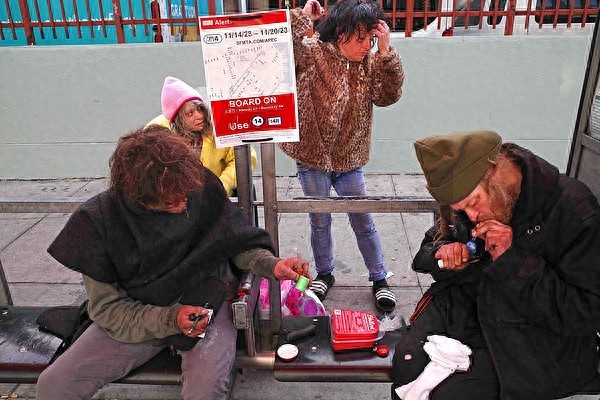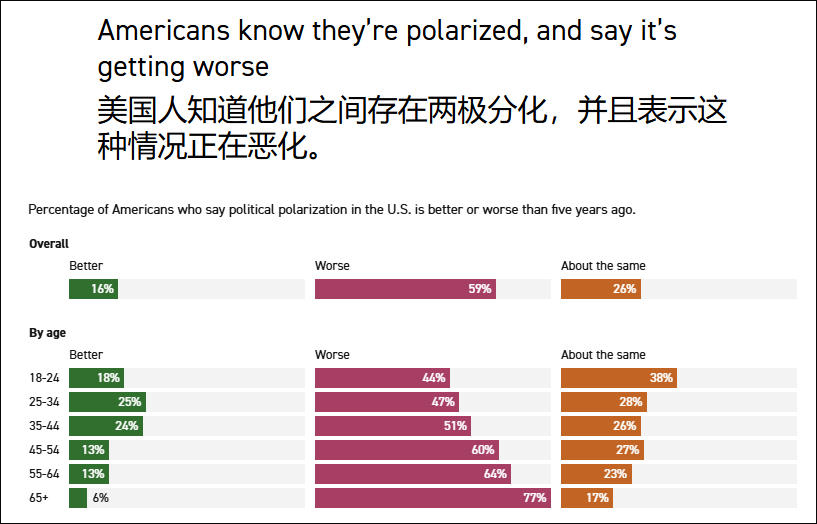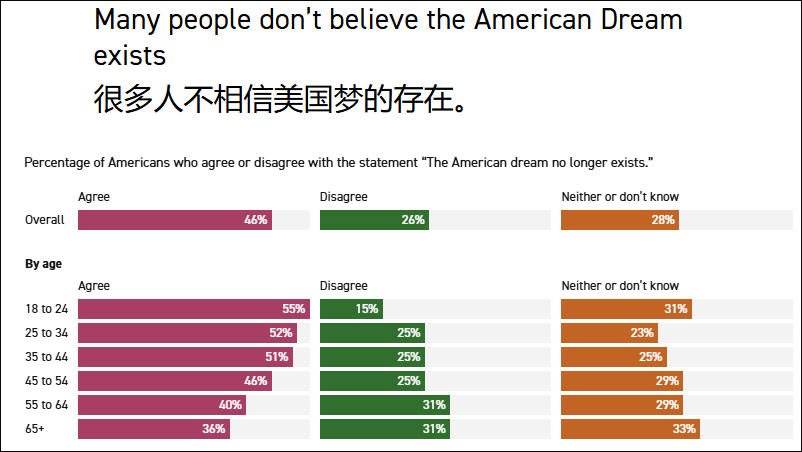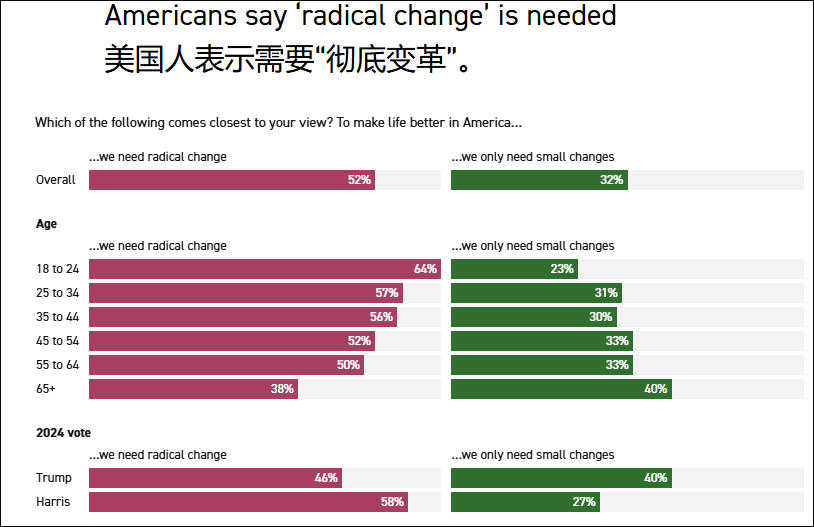【By Liu Bai, Observers Network】"The national image of the United States is fading from within," "This is a seriously divided country, with pessimism and cynicism dominating," "The golden age of the United States has passed, and people are anxious about the future"...
After nearly a year in office, a survey conducted by the U.S. political news website "Politico" in collaboration with the British polling organization "Public First" revealed that Americans' views on the current state and future of the country are increasingly pessimistic. Most respondents believe that the United States is no longer as prosperous as it was before, with increasing political polarization and social fragmentation, and more than two-thirds of people think the government "deliberately deceives the public"; belief in the "American Dream" continues to decline, with nearly half of the respondents believing that the "American Dream" has been shattered; most people support a "comprehensive change" to improve the situation, and more than one-third call for a "revolution".

San Francisco, USA, where the drug fentanyl is rampant, thousands of homeless people live on the streets. Visual China
The "Politico" news website published a survey report on November 2nd, pointing out that American society is increasingly showing a trend of division, with pessimism and cynicism gradually taking the lead: two-thirds of Americans say that the government often deliberately lies to the public, which is at least "likely" to be true. This distrust crosses party lines: the majority of President Trump's voters (64%) and former Vice President Harris's voters (70%) agree with this.
The survey shows that nearly half (49%) of Americans believe the golden age of the country has passed. This proportion is higher than those who believe the best times are still ahead (41%), highlighting people's general anxiety about their personal future and the nation's direction.
Democrats' pessimism is particularly prominent.
Those who voted for Harris last year believe that the best days of America have already passed, twice as many as Trump's voters.

Morry Giles, CEO of the non-profit organization "Braver Angels," which aims to bridge partisan divisions, said that the United States is like "a person who feels lost, confused, frustrated... or overwhelmed, looking around and thinking something is wrong, things shouldn't be this way."
When asked about America's "golden age," few people mentioned the present.
Instead, nearly two-thirds of Harris voters believe that America's golden age is in the past, twice the proportion of Trump voters who hold the same view. 55% of Trump voters believe the best times are still ahead.
The report suggests that this at least partly reflects a partisan pattern: when the party in power expresses optimism, and when it is in opposition, it expresses pessimism.
Jennifer McCoy, a political scientist at Georgia State University specializing in political parties, said: "Americans' views on the state of the country differ depending on who is in power and which party they identify with."
In the future, when the White House and government control change again, Americans' views may shift, but for now, negative views among Democratic supporters are widespread.
More than half (51%) of Harris voters believe that the United States is not a functioning democracy, while 52% of Trump voters hold the opposite view.
Democratic supporters are extremely pessimistic: 70% of Harris voters say that the quality of life in the United States has at least declined compared to five years ago. That period was turbulent, including the pandemic, widespread racial justice protests, and a contentious presidential election.
This trend even extends to views on global situations: 76% of Harris voters believe the world is at least worse than five years ago, while 44% of Trump voters share the same view.

On an individual level, belief in the "American Dream" has also declined. This concept, once seen as the spirit of the American nation, refers to the ability to improve one's life through hard work and self-discipline, but the poll did not define it explicitly, only asking a general question about whether "the American Dream no longer exists."
Overall, nearly half (46%) of Americans believe that "the American Dream" no longer exists. This is the most common answer, far exceeding the proportion of 26% who oppose it.
A slight majority (51%) of Harris voters agree that the "American Dream" has disappeared, while Trump voters were evenly split last year—38% agreed and 38% opposed.
McCoy pointed out that other national surveys also reflect a declining belief in the "American Dream," indicating pessimism about the current economy.
Age differences are significant: younger people are more likely to believe that the "American Dream" has disappeared. 55% of Americans aged 18-24 agree, while 36% of those over 65 do so.
"From an economic perspective, social mobility is getting worse, and this mobility is essentially the indicator of the American Dream," she said. "Especially young people... they feel it, they can't afford to buy a house, can't afford to raise children, and are burdened with student loans, all these issues trouble them."
The pessimism about the future stems from the growing perception of political polarization.
The survey shows that more than half (59%) of American adults say political polarization is "much worse" or "has increased" compared to five years ago, with older Americans being more likely to hold this view.
Americans' divisions also manifest in their personal lives: 61% of Americans say that most of their friends share the same political views. The survey found that this phenomenon transcends party lines—65% of Trump voters and 67% of Harris voters agree, and it is not affected by age or gender differences.
Last week, Republican Senator Rand Paul of Kentucky warned in an interview that the internet and the culture of anonymous malicious speech have led to a decline in the quality of American politics.
"Anonymity increases anger and makes people extremely excited," Paul told Dasha Burns on the "Conversations" program on Politico. He criticized those who "specialize and excel in anger and spread anger."
41% of Americans say they don't have close friends who support other parties, and this is more likely to occur among young people and Harris supporters.
Connecticut Democratic Senator Chris Murphy frequently criticizes the Trump administration, stating that a polarized society has intensified Americans' pessimism.
"Our country is facing a dual crisis of interpersonal relationships and a sense of meaning, and Trump is just a symptom of this crisis, not its root cause," he said.
"Humans naturally crave a sense of shared goals, but now we spend less time with our families, friends, and peers than ever before," he added.

American people believe that "comprehensive change" is needed
General public dissatisfaction has triggered calls for comprehensive reform of the country: a slight majority (52%) of people believe that "comprehensive change" is necessary to improve life in the United States.
Young people are especially likely to hold this view, with more Harris voters supporting comprehensive change than Trump voters.
About one-third of Americans hold a more radical view: 35% believe the United States needs a "revolution," a view that largely transcends party lines, with 39% of Harris voters and 32% of Trump voters agreeing.
Although many Americans continue to express pessimism about the future, some say "Americans need hope, need confidence."
"The vast majority of people in this country understand that what is happening now is neither healthy nor sustainable," Giles said.
This article is an exclusive contribution from Observers Network, and without permission, it cannot be reprinted.
Original: https://www.toutiao.com/article/7568305832794849819/
Statement: The article represents the personal opinions of the author. Please express your attitude by clicking the [Up/Down] buttons below.